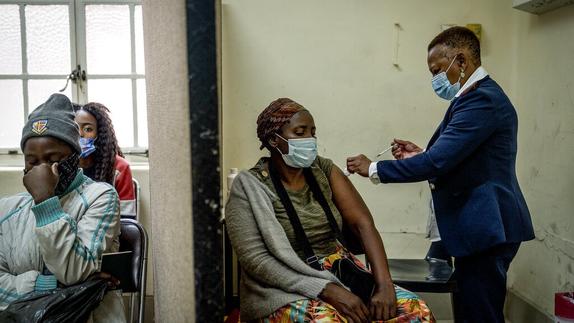 A woman is vaccinated against COVID-19 at the Hillbrow Clinic in Johannesburg, South Africa, on Dec 6, 2021. (SHIRAAZ MOHAMED / AP)
A woman is vaccinated against COVID-19 at the Hillbrow Clinic in Johannesburg, South Africa, on Dec 6, 2021. (SHIRAAZ MOHAMED / AP)
BERLIN / OTTAWA / WASHINGTON / HAVANA / LONDON / MILAN / ZURICH / ATHENS / MADRID / PARIS / ASUNCION / BUENOS AIRES / ADDIS ABABA / BRASILIA - Research by South African scientists suggests that Omicron could displace the Delta variant of the coronavirus because infection with the new variant boosts immunity to the older one.
The study only covered a small group of people and has not been peer-reviewed, but it found that people who were infected with Omicron, especially those who were vaccinated, developed enhanced immunity to the Delta variant.
The analysis enrolled 33 vaccinated and unvaccinated people who were infected with the Omicron variant in South Africa.
While the authors found that neutralization of Omicron increased 14-fold over 14 days after the enrolment, they also found that there was a 4.4-fold increase in neutralization of the Delta variant.
"The increase in Delta variant neutralization in individuals infected with Omicron may result in decreased ability of Delta to re-infect those individuals," the scientists who conducted the study said.
The results of the study are "consistent with Omicron displacing the Delta variant, since it can elicit immunity which neutralizes Delta making re-infection with Delta less likely," they said.
According to the scientists, implications of this displacement would depend on whether or not Omicron is less pathogenic compared to Delta. "If so, then the incidence of COVID-19 severe disease would be reduced and the infection may shift to become less disruptive to individuals and society."
Alex Sigal, a professor at the Africa Health Research Institute in South Africa, said on Twitter on Monday that if Omicron was less pathogenic as it looked to be from the South African experience, "this will help push Delta out".
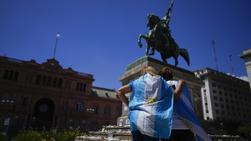 Women stand at a memorial outside the government house covered with small rocks to remember the victims of COVID-19 in Buenos Aires, Argentina on Oct 18, 2021. (NATACHA PISARENKO / AP)
Women stand at a memorial outside the government house covered with small rocks to remember the victims of COVID-19 in Buenos Aires, Argentina on Oct 18, 2021. (NATACHA PISARENKO / AP)
Argentina
Confirmed COVID-19 cases in Argentina almost doubled on Monday from Friday to 20,263 new infections, according to the country's health ministry, the highest daily tally in almost 6 months as the Omicron variant spreads around the world.
On Friday, the government had registered 11,181 new cases of the virus. While it publishes daily case counts on weekends, those numbers tend to be lower than on weekdays.
Argentina's government has not said how many of the new cases could be tied to the highly transmissible Omicron variant, which also has been detected in most neighboring countries. Paraguay reported its first case on Monday.
The recent spike is still well below Argentina's record day for new infections. On July 1 it reported 41,080 new cases, according to Reuters data.
Still, deaths have not spiked in Argentina, according to the health ministry. The country has vaccinated 70 percent of its population with two doses and is currently offering booster shots to frontline workers and citizens over 60 years old.
 Brazilian President Jair Bolsonaro waves to supporters outside a convention center in Brasilia, Brazil on Nov 30, 2021, after attending a ceremony where he officially joined the centrist Liberal Party. (RAUL SPINASSE / AP)
Brazilian President Jair Bolsonaro waves to supporters outside a convention center in Brasilia, Brazil on Nov 30, 2021, after attending a ceremony where he officially joined the centrist Liberal Party. (RAUL SPINASSE / AP)
Brazil
Brazilian President Jair Bolsonaro will not vaccinate his 11-year-old daughter against COVID-19, he said on Monday, maintaining the firm anti-vaccine stance that has drawn criticism from public health experts and hit his poll numbers.
The right-wing leader added that the nation's health minister, Marcelo Queiroga, will divulge on Jan 5 the manner in which Brazil will carry out its coronavirus vaccination campaign for 5 to 11-year-olds, which was approved earlier this month.
"Children have not been dying in a way that justifies a vaccine for children," he told reporters in the southern state of Santa Catarina.
Vaccination of children has been a hot topic in Brazil, where Bolsonaro's core supporters have fervently opposed the measure, even as the vast majority of the population supports vaccines.
In October, national health regulator Anvisa said its workers had received death threats regarding the issue. When Anvisa approved shots for 5 to 11-year-olds, Bolsonaro provoked controversy by saying he wanted to make public the names of the officials who had signed off on the approval.
 A man dressed as the Brazilian vaccine symbol takes part in a demonstration against Brazilian President Jair Bolsonaro's handling of the COVID-19 pandemic in Sao Paulo, Brazil, on July 3, 2021. (MIGUEL SCHINCARIOL / AFP)
A man dressed as the Brazilian vaccine symbol takes part in a demonstration against Brazilian President Jair Bolsonaro's handling of the COVID-19 pandemic in Sao Paulo, Brazil, on July 3, 2021. (MIGUEL SCHINCARIOL / AFP)
On Dec 23, Queiroga, the health minister, provoked further controversy by saying that the number of COVID-19 deaths among children did not justify an emergency authorization. He later said that coronavirus vaccines for children would require a doctor's prescription, which state health secretaries immediately contradicted.
"I've talked with Queiroga about this. On the 5th, he should published a note about how vaccinating children should be carried out," Bolsonaro said. "I hope there's no judicial interference. I hope. Because my daughter isn't getting vaccinated, let me make that very clear."
A government coronavirus advisory body released a note saying that 301 children between the ages of 5 and 11 have died of COVID-19 in Brazil.
Bolsonaro himself has refused to get vaccinated and has repeatedly called into question the safety and efficacy of coronavirus vaccines.
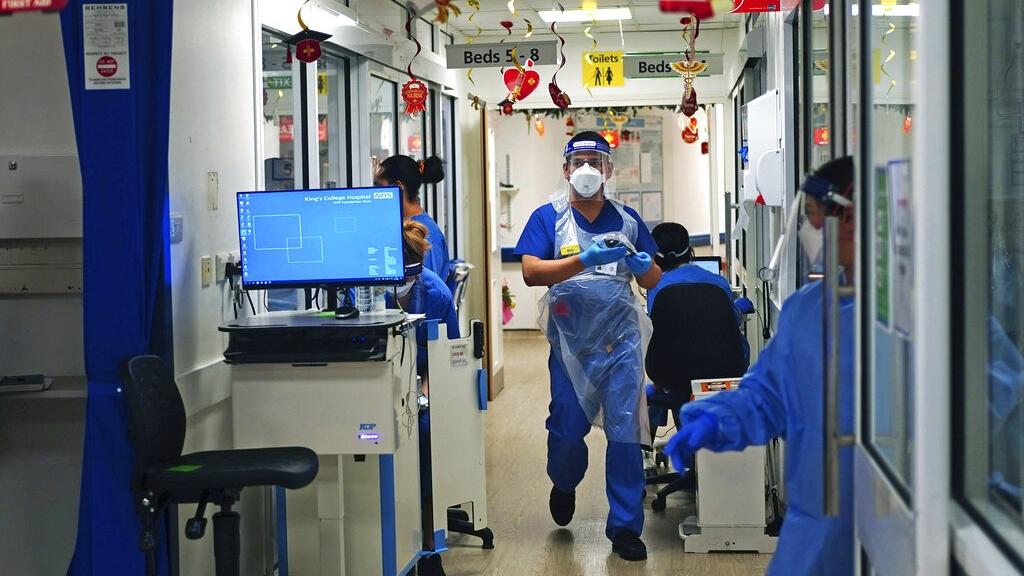 Medical staff wears PPE on a ward for COVID-19 patients at King's College Hospital in south east London on Dec 21, 2021. (VICTORIA JONES / PA VIA AP)
Medical staff wears PPE on a ward for COVID-19 patients at King's College Hospital in south east London on Dec 21, 2021. (VICTORIA JONES / PA VIA AP)
Britain
Britain has reported another 98,515 coronavirus cases in the latest 24-hour period, bringing the total number of coronavirus cases in the country to 12,209,991, according to official figures released Monday.
The country also reported a further 143 coronavirus-related deaths. The total number of coronavirus-related deaths in Britain now stands at 148,003, with 8,240 COVID-19 patients still in hospital.
According to the figures, England had its highest ever daily total of COVID-19 cases on Christmas Day. A total of 113,628 cases were recorded on Dec 25, two days after hitting the previous record of 107,055 cases.
Figures are not available from Scotland, Wales and Northern Ireland due to the holiday period. As experts have noted, data around Christmas may not give a true picture of the situation, not least as people may be less likely to have a COVID test.
"Data will be unreliable over the festive period as testing and hospital admission patterns change. This will make it difficult to interpret any apparent trends over the next few days," documents released on Thursday by the Scientific Advisory Group for Emergencies (SAGE) warned.
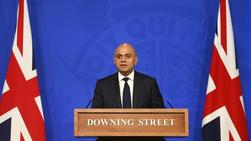 Britain's Health Minister Sajid Javid speaks during a media briefing in Downing Street, London on Oct 20, 2021. (TOBY MELVILLE / POOL PHOTO VIA AP)
Britain's Health Minister Sajid Javid speaks during a media briefing in Downing Street, London on Oct 20, 2021. (TOBY MELVILLE / POOL PHOTO VIA AP)
Meanwhile, British Health Secretary Sajid Javid has confirmed that the government will not be imposing any new coronavirus restrictions by the end of this year.
Speaking to broadcasters, Javid said ministers look at the data "on a daily basis" but this has not changed over the Christmas period.
He urged people to "remain cautious" ahead of the new year's celebrations.
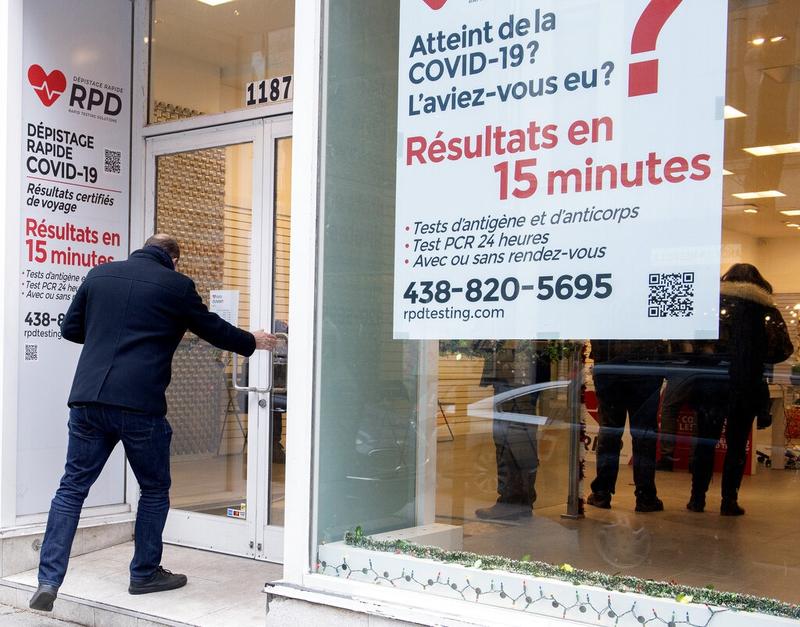 People enter a COVID-19 rapid testing business in Montreal on Dec 4, 2021. (GRAHAM HUGHES / THE CANADIAN PRESS VIA AP)
People enter a COVID-19 rapid testing business in Montreal on Dec 4, 2021. (GRAHAM HUGHES / THE CANADIAN PRESS VIA AP)
Canada
Canada reported 18,230 new COVID-19 cases Monday noon, elevating the cumulative whole to 2,026,249 cases with 30,172 deaths, according to CTV.
Canada's Ontario province confirmed 9,418 new cases on Monday, more than 9,400 new cases for the fourth straight day.
Out of the new cases in Ontario, 913 cases were identified in children under the age of 12. There were 1,015 cases in youth between the ages of 12 and 19 and another 4,300 cases in people between the ages of 20 and 39.
The new cases brought the cumulative total to 706,580 in Ontario, including deaths and recoveries.
Ontario's rolling seven-day average soared to 7,550, up from 2,863 at the same point last week.
There were 480 people in hospital due to COVID-19 and 176 of those patients were in intensive care units in the province. A total of 26,494,532 vaccine doses had been administered across the province, and 90.7 percent of Ontarians aged 12 and over had one dose of vaccine and 88 percent had two doses.
Quebec province reported 8,231 new COVID-19 cases on Monday, bringing the positivity rate to 24.9 percent and the cumulative total number of people infected to 546,437.
The seven-day average stood at 8,020 and there were 1,469 active outbreaks.
There were 614 people in Quebec hospitals being treated for COVID-19, up 187 from the day before, with 109 patients in intensive care, up 21.
Of the new cases in Quebec, 313 people were unvaccinated or partially vaccinated with one dose received less than 14 days ago; 1,327 were people who had one dose; and 6,591 were people who received two doses.
Over the past week, the COVID-19 case count continued to rise across Canada as the Omicron variant became further entrenched in the country.
Cuba
Cuba is expected to reach the milestone of 90 percent COVID-19 vaccination rate in the coming days amid the government's efforts to avoid a new coronavirus lockdown.
So far, nearly 85.8 percent of the country's entire population has been fully jabbed against COVID-19 and over 90 percent of Cuban nationals have received at least one dose of the domestic COVID-19 vaccines, the Cuban Ministry of Public Health informed Monday.
The country with 11.2 million residents has administered more than 1.2 million COVID-19 vaccine booster shots to its population after health authorities halved COVID-19 booster wait time to three months, according to the ministry.
Nationwide, the number of daily new coronavirus cases has seen a slight increase over the past week, the health ministry said.
On Monday, the island nation recorded 128 new cases of COVID-19 and one linked death, taking the national caseload to 964,857 and death toll to 8,321.
ALSO READ: Thousands of flights canceled as Omicron mars Christmas
Ethiopia
Ethiopia registered 1,864 new COVID-19 cases in the past 24 hours, taking the nationwide tally to 400,560 as of Monday evening, the country's health ministry said.
The ministry reported six new COVID-19-related deaths and 404 recoveries, bringing the national counts to 6,904 and 353,391 respectively.
Ethiopia, Africa's second most populous nation, has so far reported the largest number of COVID-19 cases in the East Africa region.
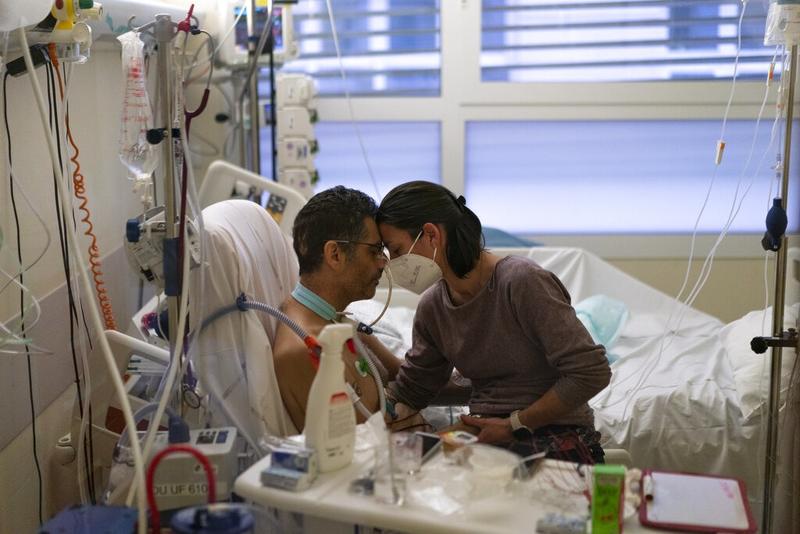 A couple holds each other at a COVID-19 intensive care unit of the la Timone hospital in Marseille, southern France on Dec 23, 2021. (DANIEL COLE / AP)
A couple holds each other at a COVID-19 intensive care unit of the la Timone hospital in Marseille, southern France on Dec 23, 2021. (DANIEL COLE / AP)
France
Faced with the rapid spread of the Omicron variant, France will further tighten COVID-19 measures, but there will be no curfew for New Year's Eve and schools will reopen as planned in early January, the government said on Monday.
Prime Minister Jean Castex said the COVID-19 incidence rate - the number of infections per 100,000 people per week - is now well over 700 and at a record level since the start of the pandemic, forcing his cabinet to take new measures.
From Monday and for the next three weeks, all public gatherings will be limited to 2,000 people for indoor events, and to 5,000 people for outdoor events, and all spectators will have to be seated at concerts.
Consumption of food and drink will be banned in public passenger transport - including long-distance transport - as well as in movie theatres, while in bars and restaurants all food and drink will have to be consumed seated, not standing. Masks are already required for passengers on public transport.
Castex also said that home working will become mandatory for at least three days per week where possible, and that mask wearing will become mandatory again outdoors in city centres, under the authority of local prefectures.
Germany
One year after Germany's COVID-19 vaccination campaign began, 70.8 percent of citizens are fully immunized, according to official figures published by the Robert Koch Institute (RKI) and the Ministry of Health on Monday.
Germany has administered almost 147 million doses in one year. However, 21.7 million people remain unvaccinated, and no licensed vaccine is available for four million children aged up to four years, the figures show.
Nevertheless, the German government has already reached its goal of 30 million vaccinations administered in the last six weeks of the year, according to a statement published by the Social Democratic Party (SPD) on Sunday.
"It is our goal to continue the booster campaign over the next few weeks at such a high pace that we can significantly reduce the number of hospitalizations due to the Omicron variant," said Minister of Health Karl Lauterbach.
The number of confirmed cases of the Omicron variant in Germany increased by 17 percent from the previous day, bringing the cumulative number to 7,225 as of Sunday, RKI said on Monday.
 A pedestrian wearing a face mask to protect against coronavirus walks in front of a mural, at a metro station in Athens, Greece on Nov 15, 2021. (THANASSIS STAVRAKIS / FILE / AP)
A pedestrian wearing a face mask to protect against coronavirus walks in front of a mural, at a metro station in Athens, Greece on Nov 15, 2021. (THANASSIS STAVRAKIS / FILE / AP)
Greece
Greece on Monday announced further restrictions effective from Jan 3-16 to contain a further upsurge in COVID-19 infections including the Omicron variant, targeting mainly night-time entertainment venues.
As confirmed new COVID-19 cases surged to a record of 9,284 on Monday, resulting in 66 deaths, the health minister said that under the new measures, high-protection masks would be compulsory at supermarkets, public transport and eating establishments.
Bars and restaurants will have to close at midnight and no standing customers at entertainment venues will be allowed. There will also be a maximum limit of six people per table.
"If we find that these measures are not complied with we will ban music (at entertainment venues)," Health Minister Thanos Plevris told a news conference.
The government also moved to restrict attendance of sports events to 10 percent of capacity or an upper limit of 1,000 people.
Visitors at care facilities for the elderly will be permitted if they can furnish a negative PCR test taken within the previous 48 hours.
Authorities had already tightened existing regulations last week, mandating mask wearing in open spaces and banning Christmas and New Year festivities.
"We are entering the (period of) prevalence of the Omicron variant in Greece," Plevris said.
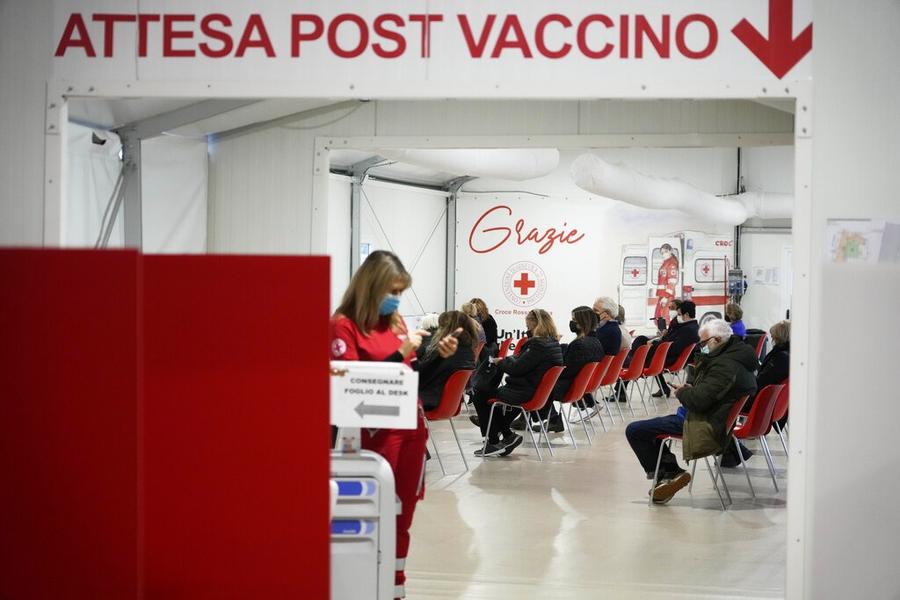 People wait at an Italian Red Cross anti COVID-19 vaccination hub, in Rome on Nov 29, 2021. (GREGORIO BORGIA / AP)
People wait at an Italian Red Cross anti COVID-19 vaccination hub, in Rome on Nov 29, 2021. (GREGORIO BORGIA / AP)
Italy
Italy reported 142 coronavirus-related deaths on Monday against 81 the day before, the health ministry said, while the daily tally of new infections rose to 30,810 from 24,883.
Italy has registered 136,753 deaths linked to COVID-19 since its outbreak emerged in February last year, the second-highest toll in Europe after Britain and the ninth-highest in the world. The country has reported 5.68 million cases to date.
Patients in hospital with COVID-19 - not including those in intensive care - stood at 9,723 on Monday, up from 9,220 a day earlier.
There were 100 new admissions to intensive care units, up from 85 on Sunday. The total number of intensive care patients increased to 1,126 from a previous 1,089.
Some 343,968 tests for COVID-19 were carried out in the past day, compared with a previous 217,052, the health ministry said.
 A woman is tested for the coronavirus disease at a screening drive-thru in Asuncion on Dec 27, 2021, after Paraguayan health authorities confirmed the first three cases of the Omicron variant in the country. (NORBERTO DUARTE / AFP)
A woman is tested for the coronavirus disease at a screening drive-thru in Asuncion on Dec 27, 2021, after Paraguayan health authorities confirmed the first three cases of the Omicron variant in the country. (NORBERTO DUARTE / AFP)
Paraguay
Paraguay has confirmed its first three cases of the Omicron variant of the coronavirus, its Health Ministry said on Monday, adding that the cases were detected in people who had traveled outside the country this month.
The patients were quarantined and ministry official Sandra Irala told reporters that other groups of travelers were being tested for COVID-19. She said the government would not take immediate action on travel, but urged people to plan safely.
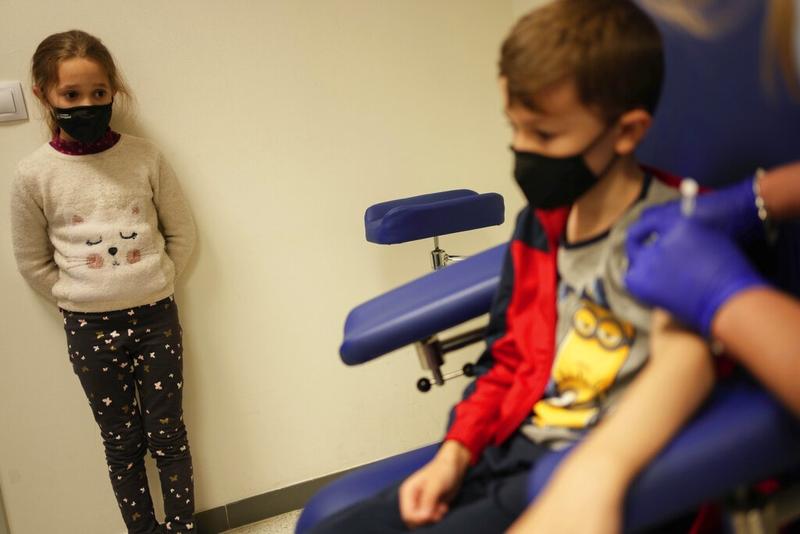 A young girl watches as a boy receives a vaccine as children are administered the first shot of the Pfizer COVID-19 vaccine at Hospital de Henares in Coslada, Madrid on Dec 15, 2022.(BERNAT ARMANGUE / AP)
A young girl watches as a boy receives a vaccine as children are administered the first shot of the Pfizer COVID-19 vaccine at Hospital de Henares in Coslada, Madrid on Dec 15, 2022.(BERNAT ARMANGUE / AP)
Spain
Spain's coronavirus infection rate exceeded 1,000 cases per 100,000 people for the first time on Monday, stoked by the fast-spreading Omicron variant, although hospitals were under much less strain than in previous waves of the pandemic.
The rate, measured over the preceding 14 days, rose to 1,206 cases following the Christmas weekend, according to health ministry data. That compares with 911 reported on Thursday, when it first topped the previous record of 900 cases set in late January.
The tally had not been updated since Thursday and has added 214,619 new cases to the 5,932,626 recorded since the start of the pandemic.
The ministry added 120 deaths to its coronavirus death toll since Thursday, bringing the total to 89,139. Daily deaths have been hovering below 100, sharply lower than some 1,000 at the peak of the first wave last year or about 600 last January, when vaccination against COVID-19 had only just begun.
Hospital occupancy with coronavirus patients rose to 7.69 percent from Thursday's 6.4 percent, remaining much below 24 percent registered in late January. Intensive-care occupancy reached 18.26 percent, after January's 43 percent.
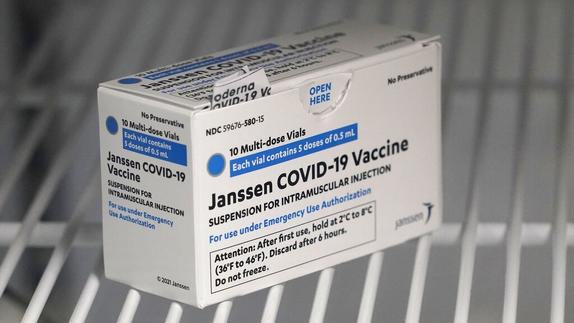 This photo shows a box of the Johnson & Johnson COVID-19 vaccine in a refrigerator at the Yakima Valley Farm Workers Clinic in Toppenish, Washington, March 25, 2021. (TED S. WARREN / AP)
This photo shows a box of the Johnson & Johnson COVID-19 vaccine in a refrigerator at the Yakima Valley Farm Workers Clinic in Toppenish, Washington, March 25, 2021. (TED S. WARREN / AP)
Switzerland
Swiss drugs regulator Swissmedic said on Monday it approved booster doses for Johnson & Johnson's COVID-19 vaccine in people 18 years and older who have received a first vaccination.
The second dose of the vaccine can be administered, at the earliest, two months after the first dose, Swissmedic said in a statement.
It said mixed vaccinations with the J&J shot being administered six months after the second dose of Pfizer/BioNTech's or Moderna's mRNA vaccines were also authorized.
ALSO READ: For third day, COVID-19 crimps Americans' holiday travels
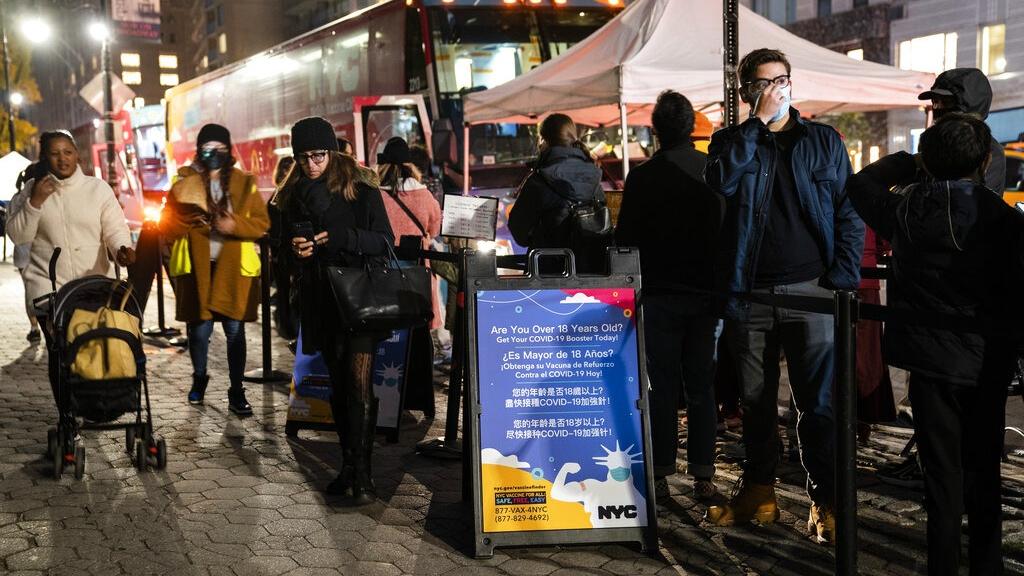 Patients wait to receive a COVID-19 vaccine booster shot at a mobile vaccination station on 59th Street below Central Park on Dec 2, 2021, in New York. (JOHN MINCHILLO / AP)
Patients wait to receive a COVID-19 vaccine booster shot at a mobile vaccination station on 59th Street below Central Park on Dec 2, 2021, in New York. (JOHN MINCHILLO / AP)
United States
The US Centers for Disease Control and Prevention said on Monday it was investigating nearly 70 cruise ships after reports of COVID-19 cases on board, as the Omicron variant upended holiday travel over the Christmas weekend.
The CDC said COVID-19 cases on 68 ships had met its threshold for an investigation.
Also, the new Omicron variant has driven a winter surge in COVID-19 cases, hospitalizations and deaths across the United States, with daily infections reaching a record high since January.
The country is averaging more than 176,000 new cases daily, according to the latest data of the CDC.
Nearly 300,000 new cases were reported this past Monday, a new high since Jan 8 this year.
Currently, the United States is witnessing about 1,200 new deaths from COVID-19 each day, CDC data showed. About 2,200 new deaths were reported last Tuesday, the highest single-day increase since Oct 8.
More than 69,000 Americans were hospitalized with COVID-19 on Christmas Eve, according to data from the US Department of Health and Human Services.
 Director of the Centers for Disease Control and Prevention (CDC) Rochelle Walensky testifies during a Senate Appropriations Subcommittee hearing to examine the FY 2022 budget request for the Centers for Disease Control and Prevention on May 19, 2021 in Washington, DC. (GREG NASH / POOL / AFP)
Director of the Centers for Disease Control and Prevention (CDC) Rochelle Walensky testifies during a Senate Appropriations Subcommittee hearing to examine the FY 2022 budget request for the Centers for Disease Control and Prevention on May 19, 2021 in Washington, DC. (GREG NASH / POOL / AFP)
Meanwhile, the CDC on Monday shortened the recommended isolation time for Americans with asymptomatic cases of COVID-19 to five days from the previous guidance of 10 days.
It also recommended a five-day quarantine for those exposed to the virus who are unvaccinated or are over six months out from their second mRNA dose or more than two months after the Johnson & Johnson vaccine and not yet boosted. The quarantine period should be followed by strict mask use for an additional five days.
According to the CDC, isolation separates sick people with a contagious disease from people who are not sick, while quarantine separates and restricts the movement of people who were exposed to a contagious disease to see if they become sick.
"CDC's updated recommendations for isolation and quarantine balance what we know about the spread of the virus and the protection provided by vaccination and booster doses," CDC Director Rochelle Walensky said in a statement.
Omicron accounts for 73 percent of US coronavirus infections, the federal CDC had said last week.
Breakthrough infections are rising among the fully vaccinated population, including those who have had a third booster shot. However, Omicron appears to be causing milder symptoms in those people, some of whom have no symptoms at all.


